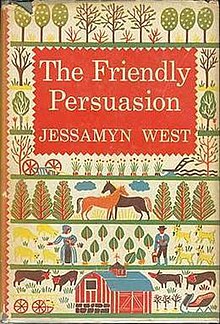The Friendly Persuasion

First edition
|
|
| Author | Jessamyn West |
|---|---|
| Country | United States |
| Language | English |
| Genre | Historical fiction |
| Publisher | Harcourt, Inc. |
|
Publication date
|
1945 |
| Media type | |
| Pages | 214 |
| ISBN | |
The Friendly Persuasion is an American novel published in 1945 by Jessamyn West. It was adapted as the motion picture Friendly Persuasion in 1956. The book consists of 14 vignettes about a Quaker farming family, the Birdwells, living near the town of Vernon in southern Indiana along "the banks of the Muscatatuck, where once the woods stretched, dark row on row." The Birdwells' farm, Maple Grove Nursery, was handed down to them by pioneering forebears who came west nearly fifty years before the onset of the novel. Originally published between 1940 and 1945 as individual stories in Prairie Schooner, Collier's, Harper's Bazaar, The Atlantic Monthly, the Ladies' Home Journal, New Mexico Quarterly Review, and Harper's Magazine, West had them reprinted in more or less chronological order covering a forty-year span of the Birdwell family's lives in the latter half of the 19th Century.
West gained the background material for her stories while recuperating at home from a nearly fatal bout with tuberculosis in the early 1930s. Having gone home to die, West improbably recovered and her mother, Grace Milhous West, shared with her during the recovery childhood memories of growing up as a Quaker girl in southern Indiana, and particularly of grandparents Joshua and Elizabeth Milhous, who became the models for the Birdwells. At the time West had quit teaching to write, without success, and the enforced inactivity of her recovery resulted in short stories. In 1969, West published a companion novel, Except for Me and Thee, whose stories filled in the history of the Birdwells, including how they courted, married, and moved to Indiana.
The Friendly Persuasion has as its common theme linking the fourteen chapters (only two of which, "A Likely Exchange" and "First Day Finish" are otherwise connected) the effects of the Quaker religion on members of a family and their interaction with their neighbors. West uses rich descriptives of geography and setting to bring out the dignity and strength of her characters. However her stated purpose in telling their story is to present descriptions of "real life" and "reality" as she understands them, not to elucidate the religion, stating that the Birdwells are characters "who happened to be Quaker" rather than personifications of Quaker traits.
...
Wikipedia
